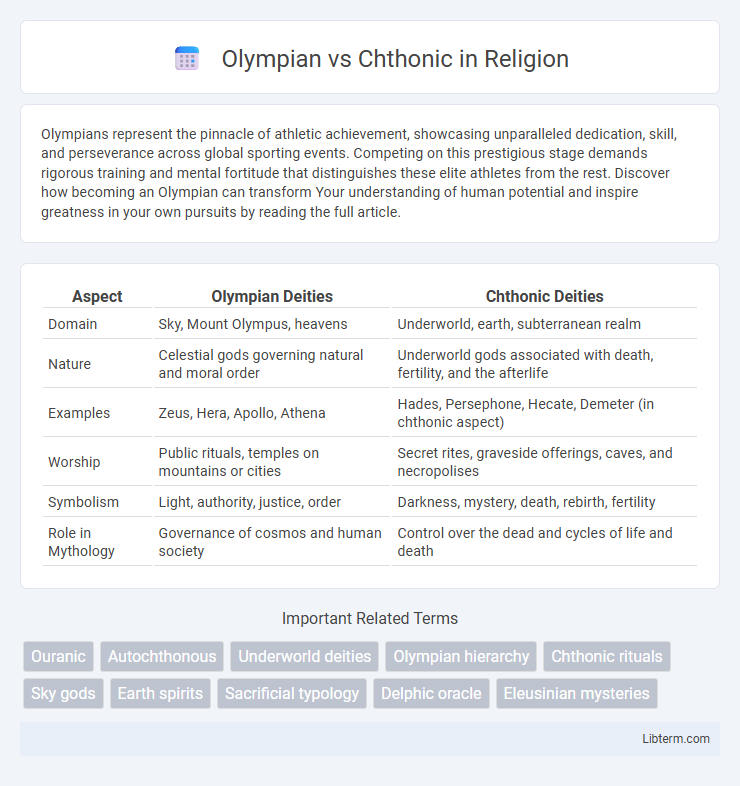Olympians represent the pinnacle of athletic achievement, showcasing unparalleled dedication, skill, and perseverance across global sporting events. Competing on this prestigious stage demands rigorous training and mental fortitude that distinguishes these elite athletes from the rest. Discover how becoming an Olympian can transform Your understanding of human potential and inspire greatness in your own pursuits by reading the full article.
Table of Comparison
| Aspect | Olympian Deities | Chthonic Deities |
|---|---|---|
| Domain | Sky, Mount Olympus, heavens | Underworld, earth, subterranean realm |
| Nature | Celestial gods governing natural and moral order | Underworld gods associated with death, fertility, and the afterlife |
| Examples | Zeus, Hera, Apollo, Athena | Hades, Persephone, Hecate, Demeter (in chthonic aspect) |
| Worship | Public rituals, temples on mountains or cities | Secret rites, graveside offerings, caves, and necropolises |
| Symbolism | Light, authority, justice, order | Darkness, mystery, death, rebirth, fertility |
| Role in Mythology | Governance of cosmos and human society | Control over the dead and cycles of life and death |
Defining Olympian and Chthonic Deities
Olympian deities are gods and goddesses who reside on Mount Olympus, symbolizing sky, light, and order, including Zeus, Hera, and Athena. Chthonic deities, in contrast, are associated with the underworld, earth, and death, such as Hades, Persephone, and Hecate. These two categories define Greek mythology's dual cosmic structure between the celestial and subterranean realms.
Origins in Ancient Mythology
Olympian gods originate from Greek mythology, embodying the supreme deities residing on Mount Olympus, symbolizing order, sky, and authority. Chthonic deities derive from ancient mythologies often associated with the underworld, earth, and death, representing primal and subterranean forces. The opposition between Olympian and Chthonic gods reflects ancient cultures' interpretation of cosmic duality, balancing light and darkness, life and death.
The Role of Olympian Gods
The Olympian gods, residing on Mount Olympus, symbolize order, authority, and the governing forces of the cosmos, overseeing human affairs, justice, and societal norms. Their roles include controlling natural phenomena, granting favors or punishments, and maintaining cosmic balance, exemplified by Zeus as the king of gods, Hera as the goddess of marriage, and Athena as the goddess of wisdom and war strategy. In contrast to the chthonic deities associated with the underworld and fertility cycles, Olympian gods represent celestial power and the visible, structured divine hierarchy influencing ancient Greek culture and religion.
The Realm of Chthonic Deities
The realm of Chthonic deities encompasses the underworld and subterranean regions associated with death, fertility, and the mysteries of life beyond the visible world. Unlike Olympian gods who preside over the sky and earthly domains, Chthonic beings govern the afterlife, the spirits of the dead, and the cycle of decay and regeneration. Deities such as Hades, Persephone, and Hecate embody this underworld realm, symbolizing deeper spiritual and natural forces beneath the surface.
Symbolism and Representations
Olympian deities symbolize order, authority, and celestial power, often represented by lightning bolts, thrones, and imperial regalia, reflecting their dominion over the sky and civilization. Chthonic gods embody the mysteries of the underworld, death, and fertility, frequently symbolized by serpents, shadows, and earth-bound imagery that connect them to the cycle of life and the afterlife. These contrasting symbols emphasize the dichotomy between celestial governance and subterranean forces in ancient mythology.
Worship Practices and Rituals
Olympian deities were worshiped through public ceremonies, sacrifices, and festivals held in grand temples atop mountains or city centers, emphasizing communal participation and order. Chthonic gods received offerings in underground sanctuaries or caves, often involving nocturnal rites, libations poured into the earth, and rituals emphasizing death, rebirth, and the afterlife. The stark contrast between Olympian sunlight ceremonies and Chthonic shadow rituals reflects their distinct domains and spiritual significance in ancient Greek religion.
Moral and Philosophical Associations
Olympian deities symbolize order, rationality, and justice, reflecting humanity's pursuit of harmony and ethical governance. In contrast, Chthonic gods embody the primal forces of nature, the subconscious, and death, representing acceptance of chaos, mortality, and the cyclical aspects of existence. This dichotomy illustrates moral philosophy's tension between structured societal norms and the acknowledgment of life's inherent uncertainties and transformations.
Cultural Impact and Legacy
Olympian gods such as Zeus, Hera, and Apollo shaped ancient Greek culture through their association with sky, order, and civilization, influencing Western art, literature, and political ideals for millennia. Chthonic deities like Hades and Persephone represent the underworld, death, and the cycle of life, deeply impacting rituals surrounding mortality and agricultural cycles. The enduring legacy of both pantheons is evident in modern cultural expressions, mythology studies, and the symbolic motifs embedded in contemporary storytelling and psychology.
Comparative Analysis: Olympian vs Chthonic
Olympian deities embody the celestial and order-driven aspects of ancient mythology, presiding over the sky and human affairs with attributes like justice, light, and governance, exemplified by gods such as Zeus and Athena. Chthonic gods, by contrast, govern the earth, underworld, and fertility, often associated with darkness, death, and rebirth cycles, including figures like Hades and Persephone. The comparative analysis highlights the Olympians' role in maintaining cosmic order and societal laws, whereas chthonic deities emphasize natural cycles, subterranean mysteries, and transformative power linked to life and death.
Modern Interpretations and Influence
Modern interpretations of Olympian gods emphasize their roles as symbols of order, justice, and cultural ideals, often portrayed in literature and media as embodiments of heroism and governance. In contrast, Chthonic deities are increasingly explored through themes of the unconscious, transformation, and the darker aspects of human nature, influencing contemporary psychological and artistic narratives. Both Olympian and Chthonic figures shape modern spirituality and popular culture, reflecting dualities between light and shadow within human experience.
Olympian Infographic

 libterm.com
libterm.com